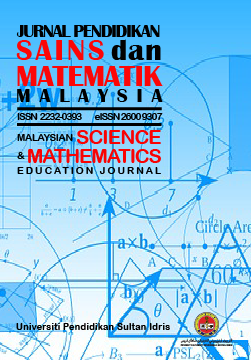Analysis of the Application of Thinking Skills in the Teaching and Learning of Science Subject in Tamil Primary Schools of North Kinta District, Perak
Analisis Pengaplikasian Kemahiran Berfikir dalam Pengajaran dan Pembelajaran Subjek Sains di Sekolah Jenis Kebangsaan (Tamil) Daerah Kinta Utara, Perak
DOI:
https://doi.org/10.37134/jpsmm.vol12.1.7.2022Keywords:
Thinking skill, Hermeneutic, Science subject, Tamil primary schoolAbstract
This study was aimed to analyze the problems in applying of thinking skills in the teaching and learning of Science subject in Tamil primary schools through Hermeneutic method. A qualitative approach was used in this study. This research focused on Tamil primary schools in North Kinta District of Perak. One teacher from each school was appointed as a respondent for this study. Data were obtained through triangulation results from questionnaire, interview and observation. The findings of the study show that respondents still face various problems when applying thinking skills in the teaching and learning of Science subject. This is because, respondents still do not master the skills of thinking holistically. Furthermore, lack of reference materials, time constraints and lack of laboratory facilities are the main reasons for not being able to implement the application of thinking skills in teaching effectively. This causes students face problems such as not understanding concepts, lack of mastery of thinking skills and also lack of interest in Science subject. The results of detailed data analysis found that although, the respondents consisted of experienced Science option teachers, but they faced many problems in the application of thinking skills in teaching Science subject. As a conclusion, teachers should master thinking skills comprehensively and apply various methods in teaching and learning to improve the mastery of thinking skills among students. The implication of this study suggested that the Ministry of Education and Science teachers should work together to solve the problems faced when applying thinking skills in the teaching and learning of Science subject so that, students can master in thinking skills effectively.
Downloads
References
Bernard Tahim Bael, Suppiah Nachiappan & Maslinda Pungut. (2021). Analisis Kesediaan Guru Dalam Pelaksanaan Kemahiran Berfikir Aras Tinggi Dalam Pembelajaran, Pengajaran dan Pemudahcaraan Abad ke-21. Muallim Journal of Social Science and Humanities, 100-119.
Bybee, R. W. (2002). Learning Science and The Science of Learning: Science educators’ essay collection. Arlington, VA: NSTA Press.
Caires, S. & Almeida, L. S. (2007). Positive Aspects Of The Teacher Training Supervision: The Student Teachers' Perspective. European Journal of Psychology of Education, 23, 515-528.
Craig, C. J. (2010). Reflective Practice In The Professions: teaching. Dalam N. Lyons, (Ed). Handbook of Reflection and Reflective Inquiry: Mapping a Way of Knowing for Professional Reflective Inquiry. London: Springer.
Fazilah Razali, Othman Talib & Azraai Othman. (2016). Aplikasi Kemahiran Proses Sains Dalam Pembelajaran Berasaskan Masalah untuk Mata Pelajaran Biologi. Jurnal Kurikulum & Pengajaran Asia Pasifik (JuKu), 4(3), 38-46.
Garnett, P. J. & Hackling, M. (1995). Students’ Alternative Conceptions in Chemistry: A Review of Research and Implications for Teaching and Learning. Studies in Science Education, 25, 69-95.
Nor’ Ain Abdullah, Azman Ismail, Mohd Fazir Abd Latif & Najihah Omar. (2015). Peranan Program Pementoran Dalam Meningkatkan Kejayaan Menti: Kajian Empirikal Amalan Komunikasi di Sebuah Universiti Awam. Malaysian Journal of Society and Space, 11(10), 89-100.
Nor Hasmaliza Hasan & Zamri Mahamod. (2016). The Perception of Malay Language Teacher at Secondary School Towards Higher Order Thinking Skills. Jurnal Pendidikan Bahasa Melayu,78-90.
Norazilawati Abdullah, Wong Kung Teck & Mahizer Hamzah. (2017). Keberkesanan Pendekatan Flipped Class Room Dalam Pembelajaran Sains di Sekolah Rendah. Jurnal Pendidikan Sains dan Matematik Malaysia 7(2),106-118.
Siti Sarah Muhammad Raflee & Lilia Halim. (2021). Keberkesanan Pemikiran Kritis dalam Meningkatkan Kemahiran dalam Penyelesaian Masalah KBAT. Jurnal Pendidikan Sains dan Matematik Malaysia, 11(1), 60-76.
Suppiah Nachiappan. (2003). Proses Kognitif Dalam Penulisan Esei Melalui Analisi Hermeneutik. Minden: Universiti Sains Malaysia (Tesis Doktor Falsafah yang tidak diterbitkan).
Suppiah Nachiappan. (2013). Proses Kognisi Dan Afeksi: Kaedah Pedagogi Hermeneutik dan Interpretasi. Tanjong Malim: Penerbit Universiti Pendidikan Sultan Idris.
Suppiah Nachiappan. (2014). Gaya Bahasa dan Proses Kognisi: Kaedah Pedagogi Hermeneutik dan Interpretasi. Tanjong Malim: Penerbit Universiti Pendidikan Sultan Idris.
Suppiah Nachiappan. (2016). Kaedah Hermeneutik: Kaedah Interpretasi Teks Secara Kualitatif. Tanjong Malim: Penerbit Universiti Pendidikan Sultan Idris.
Suppiah Nachiappan, Irna Patricia Julia, Norazilawati Abdullah, Sangkari Chandra Sehgar, Sandra Suffian & Noor Athirah Sukri. (2019). Pelaksanaan Kemahiran Berfikir Aras Tinggi oleh Guru Dalam Pengajaran dan Pembelajaran di Tadika. Jurnal Pendidikan Awal Kanak-kanak Kebangsaan, 8, 24-32.





